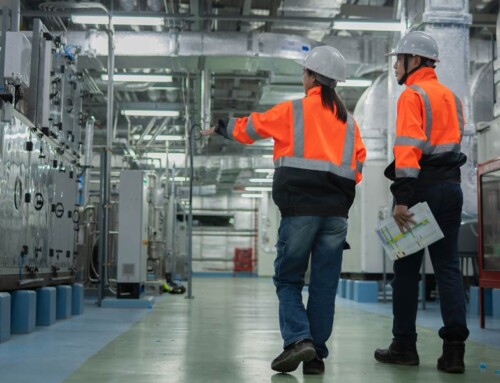Tariffs, Trade, and Turbulence: How Acme is Navigating Global Supply Chain Chaos
Tariffs, trade shifts, and supply chain instability—once distant economic concepts—have become daily realities for businesses in the cleaning, janitorial, and facility service industries.
As the United States and other countries reassess global manufacturing priorities, distributors are challenged to keep pace with rising costs, uncertain delivery timelines, and shifting sourcing strategies.
Few understand this pressure better than Ron Attman, co-CEO of Acme Paper and Supply Co., a 79-year-old, family-run distributor and an ISSA member organization. From his front-row seat in the supply chain, Attman sees firsthand how geopolitical events impact product availability and pricing and how smart companies respond.
“What happens today may change tomorrow,” Attman said. “By the time this article is printed, it could already be different.”
That kind of volatility is the new norm. Yet for Acme Paper, navigating this environment isn’t about panic—it’s about planning, partnerships, and flexibility.
Can U.S. manufacturing step up?
With mounting tariffs on Chinese goods and increased scrutiny of global supply chains, manufacturing are bringing renewed focus back to U.S. soil. But Attman cautions against viewing reshoring as a simple solution.
“This country can do anything it wants to do,” he said. “But there are serious challenges in restarting domestic manufacturing.”
Higher land, labor, and construction costs mean that anything produced domestically will likely carry a higher price tag. Even more importantly, Attman noted, manufacturers need long-term certainty before investing.
“If someone builds a plant here, there’s no guarantee that another country won’t come along later and undercut that cost by half,” he explained. “That uncertainty makes long-term investment risky.”
In short, the capacity may exist, but the sustainability of domestic production in the face of global competition remains questionable.
Shifting countries isn’t as simple as it sounds
When tariffs hit one country, many buyers look to shift sourcing to another. But Attman warned simply “moving from China to Vietnam” is more complicated than it sounds.
“It depends whether there’s manufacturing capacity in that new country,” he said. “Factories need to be built, outfitted, and staffed. And even when they are, there’s no guarantee the new facility can match the quality of the original.”
That transition time—when one facility is shutting down and another is ramping up—can cause major product disruptions. This creates a dangerous gap for companies that depend on consistency and reliability.
The power of a flexible supply chain
Acme Paper stays ahead of the curve through a sophisticated and straightforward strategy: redundancy.
“We always have alternate suppliers,” Attman said. “That was one of our strengths back in the major supply chain disruptions of 2021 and 2022, and it continues to serve us well now.”
Acme avoids total dependence on any one region or manufacturer by working with multiple vendors and proactively identifying backup sources. This agility allows them to pivot when necessary, something with which many companies struggle.
“Some of our suppliers are moving production from one country to another,” he added. “When those factories go offline temporarily, we have other options ready.”
Managing customer expectations in uncertain times
With rising prices and occasional product delays, one of the most complex parts of the job is keeping customers informed and confident.
“Some of our customers have been with us a long time. They know us. They trust us,” Attman said. “They understand we’re not trying to take advantage of the situation.”
Still, not all customers have that level of insight, and some push back when price increases hit their invoices. Acme’s approach is direct: transparency and options.
“We explain exactly what’s going on,” he said. “We’re in constant contact with our suppliers to keep costs down. And we always try to offer alternative products.”
These substitutes may not look the same, but they often match or exceed functionality, sometimes coming at a better price point. This is part of Acme’s independent, fast-moving culture.
“Being independent allows us to move quickly,” Attman added. “We can find those alternative products, get them here fast, and keep our customers running.”
Innovation as a competitive edge
While many distributors are trying to stay afloat during turbulent times, Acme Paper is pushing forward strengthening its position as an innovation leader.
“We just held our annual Innovation Show,” Attman shared. “It’s one of the things we’re most proud of.”
The event showcases only new products; manufacturers must present something truly innovative to participate. For customers, the event is a chance to explore better, more efficient, and often more sustainable solutions. For Acme, it reinforces its role as a forward-thinking partner, not just a supplier.
“We’re always looking for new products, new concepts, and new ways to help our customers be more profitable,” he said. “That’s the kind of reputation we’ve built, and that’s what we’re proud of.”
With tariff policies shifting rapidly, Attman’s advice for others in the industry is pragmatic: stay informed and flexible.
“You have to keep your ear tuned to what’s going on,” he said. “TV, radio, trade media—it all matters.”
But the real key, he added, is responsiveness.
“Flexibility is everything,” he said. “It’s the only way to keep your customers and their customers happy in a world that can shift in a heartbeat.”
Acme’s approach, built over nearly eight decades, is rooted in trust, adaptability, and a deep commitment to helping customers succeed—even when the road ahead is uncertain.
And in today’s business climate, that kind of partner is more essential than ever.
















